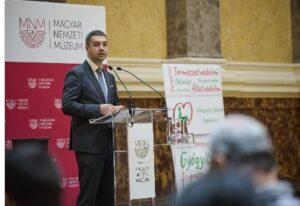Tense dilemmas in the regulation of European agriculture
Environmental sustainability is one of the most difficult topics of our time from a civilizational point of view. Although we deal a lot with the feasibility of sustainable development at the community level, we can also do a lot for this individually, said Zsolt Feldman in his welcome speech at the “Future locked in a museum? at a conference entitled “Sustainability: dream and reality”.

(Photo: AM)
The Secretary of State for Agriculture and Rural Development of the Ministry of Agriculture, in his speech to academic air chemists, collapse researchers and ecologist speakers at the event held at the Hungarian National Museum, named the European Union as the community of countries most committed to the green transition, which, however, can only meaningfully create rules for itself, the rest of the world it only tries to influence it by creating agreements. As long as, for example, agriculture is managed sustainably within the Union, this kind of responsibility cannot be taken in other parts of the world. This duality is most evident in agriculture. We demand strict rules from EU farmers in order to protect natural resources, while we do not impose such difficult production conditions on third countries, and thanks to the globalized trade, unsustainably produced agricultural products come to us even from the most distant continents, said the state secretary.
Zsolt Feldman called the positive attitude of farmers towards, for example, soil protection and ensuring biodiversity inevitable
He assessed the regulation of European agriculture as a tense contradiction, on which decisions must be made using the tools of science. Supporting this with a few examples, he said: compared to intensive animal husbandry, the environmental footprint of free-range farming with higher animal welfare standards is many times higher, and the expected encouragement of no-till farming from the EU side is very difficult in addition to the also expected restriction of pesticides in the agro-ecology program, as it is extremely difficult to to treat weeds. From the point of view of individual responsibility and the possibility of action, he highlighted the issue of reducing food waste, in this area anyone can do a lot for it. As an example, he mentioned that for a family of four, up to HUF 90,000 worth of food can end up in the bin every year. About 1.8 million tons of food waste is generated in Hungary every year, a significant proportion of which – about a third – is produced in households. Globally, every year 14% of the food raw materials produced are destroyed before they even reach the store shelves, and another 17% are thrown away by traders and consumers. The role of agriculture in sustainability is unavoidable – stated the state secretary. At the same time, agriculture is often attacked, often unfounded. The EU regulations place more and more expectations on farmers, which in reality often put their livelihoods at risk due to the decrease in profitability. That is why the compensatory role of European agricultural subsidies is important. In 2023, the conditions of the agricultural support system were completely renewed and became much stricter from an environmental point of view. At home, we strived for a balance between environmental sustainability and ensuring that farmers can implement the regulations. In the KAP Strategic Plan, Hungary had to make commitments in exchange for subsidies that by 2027, farmers will carry out soil improvement and soil protection interventions on 30% of its farmland, approximately 1.6 million hectares. We undertook to apply farming practices aimed at improving air quality on 715,000 hectares, 13.5% of our agricultural land, and we also undertook to implement sustainable nutrient management on nearly 1.2 million hectares, of course through the activities of our farmers – listed Zsolt Feldman.
AM
Related news
Related news
II. Green Gastronomy – Marketing Communication Workshop organized by the MMSZ HoReCa and Green Section
🎧 Hallgasd a cikket: Lejátszás Szünet Folytatás Leállítás Nyelv: Auto…
Read more >Retail sales of organic products in Hungary increased by 13.9% – our country is the second fastest growing market in the European Union
🎧 Hallgasd a cikket: Lejátszás Szünet Folytatás Leállítás Nyelv: Auto…
Read more >







